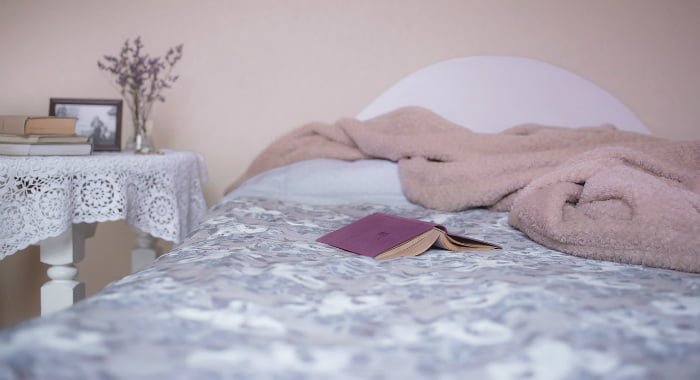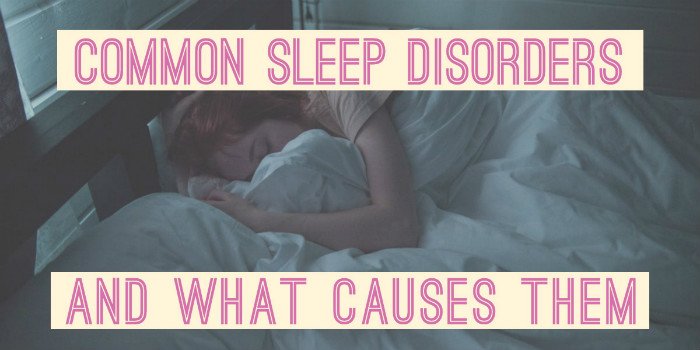There are more than 70 different types of sleep disorders in the world.
These sleep disorders prevent people from getting a solid night’s sleep, putting their health at risk. Missing just one night of sleep can ruin your mood, and make you feel drowsy and unable to concentrate.
In the long-term, it increases the risk of type 2 diabetes, obesity, high blood pressure and heart disease.
If you’ve ever laid there and wondered, “why am I having such a hard time sleeping?”, the chances are you have one of these conditions. You’re not alone in this though. Currently, nearly a third of the population suffer from common sleep disorders.
But don’t worry – the first step to a soundless night is knowing exactly what is keeping you awake. So, let’s dive into the most common sleep disorders and what causes them.
What causes sleep disorders?
Generally, sleep disorders are caused by something that affects your circadian rhythm or your sleep drive.
The circadian rhythm is your biological clock. It records elements like the light to regulate your sleep cycle, so you feel awake in the day and go to sleep at night.
The sleep drive is what tells you how much sleep you need. The longer you stay awake, the stronger your sleep drive gets. When it’s time to rest, your sleep drive makes you feel tired and ready for bed. This works in a similar way to hunger. The more your body needs food, the hungrier you feel.
There are a number of things that can interfere with these systems, including:
- Medication. Some medications interfere with the natural processes in your body by making you feel drowsy or keeping you awake at night. Not all medications have the same effect on people, but sleep disorders are most commonly linked to antidepressants, painkillers, blood-pressure medication or even common cold-relief.
- Genetics. There are certain sleep disorders that people can inherit from their parents. These disorders are caused by mutated genes that can prevent your body from releasing the right hormones or being able to regulate when they should be awake or when they should be asleep.
- Lifestyle. Certain lifestyle elements can have a big impact on your sleep, including high levels of stress, pain or overthinking – which can keep you tossing and turning through the night. Even working night shifts can affect your sleep, as it prevents your circadian rhythm from using the natural light to regulate your cycle.
- Diet. Those with high-sugary diets or drink a lot of caffeinated drinks can often suffer from sleep problems. This is because the energy from the sugar content can suppress your sleep drive and caffeine blocks the effects of the chemical adenosine which makes you feel tired.
But these aren’t the only causes of sleep disorders. There can be many factors that affect it. The exact cause depends on which type of disorder it is.
What are the most common types of sleep disorders?

Insomnia
Insomnia is the most common sleep disorder. This is because it acts as a ‘catch-all’ term for those who struggle to fall or stay asleep.
In the US, 30% of the population have insomnia. 10% also suffer from chronic insomnia, which is defined as those who struggle to sleep at least 3 nights a week for more than 3 months.
It’s a big issue that affects millions of people around the globe.
There’s no single cause of insomnia and can be related to a dozen factors including lifestyle, medication or the environment that you’re trying to sleep in.
Sleep apnea
Sleep apnea is a condition where someone will stop breathing for 10 seconds or while asleep. When this happens, your oxygen levels will drop and you’ll be woken up.
With sleep apnea, your breathing stops because your airways get blocked. There are a number of causes for this. This includes aggressive snoring which closes your throat, weight gain or nasal congestion from allergies or a cold. It’s often made worse when lying on your back.
This condition can have serious medical risks, including increased risk of heart attack, heart failure, stroke, and sudden death.
Luckily, there are treatments for sleep apnea. This includes losing weight or even undergoing surgery to remove excess tissue in the throat if needed.
Where that’s not possible, you will need to wear an oxygen face mask through the night. This mask delivers a constant flow of air while you sleep, helping to keep your airways open and you breathing soundly through the night.
Pansomnia
Pansomnia is where you engage in abnormal behaviours while asleep that can interrupt your rest or affect your health. These include:
- Night terrors. These are intense nightmares that raise your heart rate and panic while sleeping, including screaming or groaning. Night terrors are more common in children, with an estimated 1-6% of children suffering from the condition.
- Sleepwalking. This where you physically get up and move around at night, not giving your body a chance to relax your muscles in your sleep. In some cases, you can also hurt yourself by bumping into objects at night or even cause worse damage by walking into a high-risk place.
- Sleep eating. This is where you have a compulsion to eat during the night and will start helping yourself to midnight feasts while still asleep. This can cause a range of dietary issues, including weight gain, high blood pressure and increased risk of diabetes.
- REM behaviour disorder. This is where you start acting out the dreams you experience. So, if you’re fighting a bear, you might swing an arm out. Or if you’re jumping from a plane, you might jump out of bed. Depending on the activity that you do, this can cause injury to yourself or others.
Treatment for this condition depends on the type of pansomnia that you experience. If you move or walk around, the first step is to move any dangerous objects to reduce the risk of injury.
Sleep paralysis
25% of people experience sleep paralysis at least once in their lives.
This is a temporary state where you are fully conscious – but unable to move. This is because you’re stuck transitioning from being asleep to being awake. So, your mind is awake but your body still thinks it’s asleep.
Hallucinations are also common with sleep paralysis, as your brain is still feeding you images in a dream-like state.
This can be a terrifying experience, which can cause anxiety, panic and a reluctance to go back to sleep.
Restless leg syndrome

Restless leg syndrome is a neurological disorder that gives you an urge to move or bounce your legs. These feelings can be aching, burning or tingling, that can be soothed by stretching, walking or rubbing.
At night, restless leg syndrome can prevent you from falling asleep. This is because it prevents your muscles from relaxing, making it harder for your body to enter the first stage of sleep.
It can be treated by increasing the amount of iron in your diet or certain medications to relax your muscles and ease the compulsive urge to move.
Jetlag
This is where your circadian rhythm gets out of sync from rapidly travelling to a different timezone. So, if you took a plane from California to London, your circadian rhythm would be roughly 8 hours out of sync because of the different time zones.
When it’s morning in London, your body will feel like it’s time to go to bed. When it’s night time, you’ll be wide awake.
It takes time to recover from jetlag. Typically, this is one day per timezone travelled.
Narcolepsy
Narcololaspy is the sleep condition where you can unexpectedly fall asleep without warning.
It has four main symptoms that are present at different levels. These are:
- Excessive daytime sleepiness. This is where you’ll feel exceptionally tired during the day, no matter how much rest you manage to get at night. This can lead to you unexpectedly falling asleep.
- Cataplexy. This is where you lose muscle tone and can fall down or asleep in response to certain emotions, like surprise or laughter.
- Sleep paralysis. This is where you get ‘stuck’ in between being asleep and awake, as you are fully conscious but unable to move your body.
- Hypnagogic hallucinations. These are extremely vivid hallucinations that someone can see, hear or feel before falling asleep.
Narcolepsy can be managed with medication.
Chronic fatigue syndrome
Chronic fatigue syndrome (CFS) is where you feel fatigued for extended periods of time – no matter how much rest you get. This can severely impact your life, often leaving you to feel like you don’t have enough energy to complete simple tasks.
This sleep condition is hard to diagnose as other disorders, such as sleep apnea, must be ruled out first. CFS treatments include lifestyle adaptations to help conserve energy as well as medications to help relieve symptoms.
What are the symptoms of sleep disorders?

The biggest symptom of a sleep disorder is being unable to fall, or stay, asleep. Which is expected. But that can take a lot of different formats, such as:
- Taking a long time to get to sleep at night
- Waking up often in the night
- Waking up early and being unable to get back to sleep
- Having too much sleep and still feeling tired
- Feeling tired and drowsy during the day
- Finding it hard to nap when tired
- Being unable to concentrate and focus on everyday tasks
- Falling asleep in inappropriate places, such as at your desk or in a car
- Low mood or depression
This sleep score test from Sleepio can help you evaluate your symptoms and give you some practical advice and starting points on how to improve your sleep.
Are there any rare sleep disorders?
Yes. Currently, the rarest sleep disorder is fatal familial insomnia (FFI).
This condition happens when someone inherits a mutated prion protein (PRNP) gene. Because of this gene’s mutation, the body produced misformed prion proteins. These proteins are toxic to the body and build up in the thalamus of the brain.
The thalamus helps control sleep and is where the circadian rhythm is located. Over time, these proteins lead to the loss of nerve cells, damaging your bodies ability to control sleep.
At first, the symptoms of FFI are mild. But over time the inability to sleep worsens, leading to the deterioration of the brain and body. There is no cure for this disease and causes death within 12-18 months of first experiencing symptoms.
What do I do if I’m suffering from a sleep disorder?
If you’re suffering from sleep, the first step is to recognise what problems you’re having – and what might be causing it.
Are there any changes in your life recently? Are you under more stress, drinking more caffeine or getting less natural light than normal?
If you are, this might give you insights into what is causing your problem. So, to get a better night’s sleep you will need to cut back on the stress, decrease your caffeine intake (especially in the evening!) and consider investing in natural light lamps if there’s no sun outside.
There are other lifestyle changes that may also help ease your sleep disorder. This could be reducing screen time at night, creating a better bedtime routine or blocking out any outside noise that might be keeping you awake.
Whatever you do, try not to worry and overthink it. Worrying about sleep makes it much harder to fall asleep. It’s a vicious cycle that just gets worse over time.
If you can’t find anything that works for you, then consider getting in touch with your GP for more detailed advice and the next steps to a restful night.
